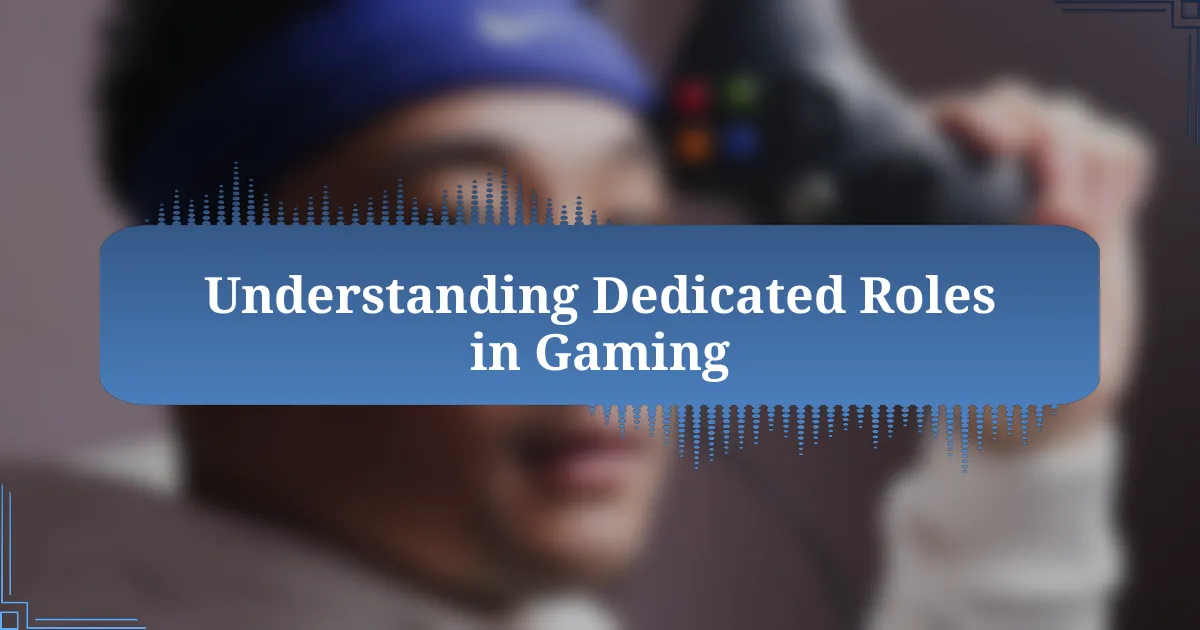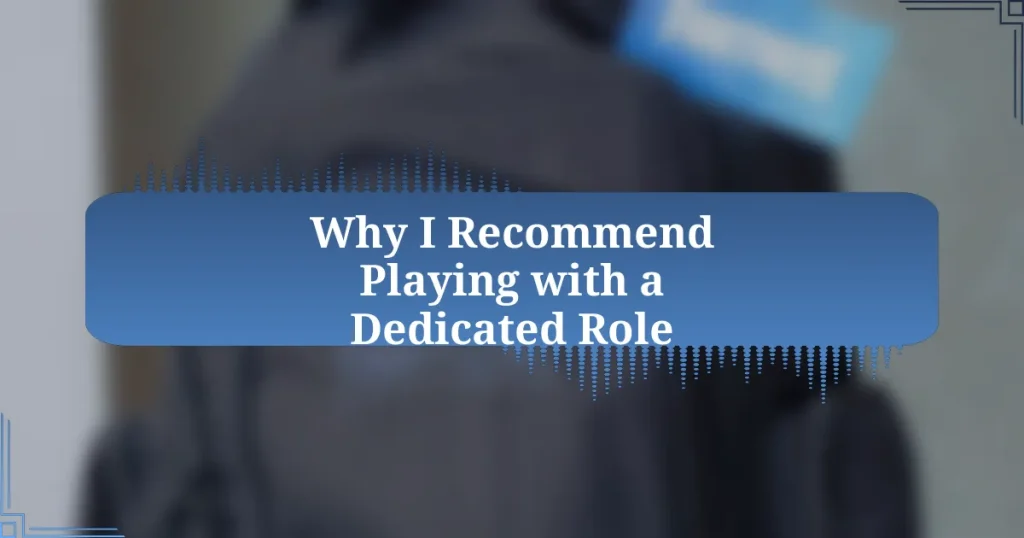Key takeaways:
- Dedicated roles in gaming create structure, allowing players to excel and enhance team performance.
- Clear role definitions foster accountability, improve synergy, and streamline communication among team members.
- Specialization in a specific role leads to personal growth, skill improvement, and discipline in gameplay.
- Embracing roles fosters trust and camaraderie, reinforcing the significance of each player’s contributions to team success.

Understanding Dedicated Roles in Gaming
Dedicated roles in gaming, especially in a competitive setting like Counter Strike 2, create a structured environment where players can truly shine. I remember the moment I decided to focus solely on being a support player; it was a game-changer for me. Suddenly, I was contributing in ways I hadn’t considered before, enhancing my team’s performance while also finding my niche.
When you understand and embrace a specific role, whether it’s entry fragger, sniper, or support, you develop a deeper mastery of the game. Have you ever thought about how a well-coordinated team can read the enemy’s movements like a book? Each player, playing their role expertly, enables the team to strategize effectively, turning individual skills into a powerful collective force.
Moreover, dedicated roles demand self-awareness and continuous improvement. I often found myself reflecting on my gameplay after each match, thinking about how I could better fulfill my role. How often do you find yourself assessing your contributions? This level of introspection not only enhances personal skill sets but also fosters a greater sense of camaraderie among teammates.

Enhancing Team Dynamics with Roles
When roles are clearly defined within a team, it creates a sense of accountability that can be incredibly motivating. I recall playing with a team where everyone had a defined position, and it felt exhilarating to know exactly what was expected of me as a support player during critical rounds. Does this kind of clarity make you feel more confident in your abilities? It certainly did for me, as it allowed me to focus intently on my responsibilities without the noise of uncertainty.
Each player brings unique strengths to the table, and when roles align with these strengths, the entire team’s synergy improves. For example, I often found that my positioning as a support allowed me to create openings for our entry fragger, effectively turning potential chaos into a well-orchestrated attack. Have you noticed how smoothly things go when everyone is in sync? That’s the magic of embracing dedicated roles; it transforms your gameplay from a fragmented effort into a cohesive strategy.
Communication plays a crucial role in enhancing team dynamics as well. My experience has shown that when players understood their roles, discussing tactics became more focused and productive. Have you ever been part of a team where the conversations flowed seamlessly? In those moments, it felt less like a game and more like a collaborative effort where everyone was working toward a common goal, reinforcing bonds both on and off the virtual battlefield.

Improving Personal Skills through Specialization
The moment I embraced a specific role in my Counter Strike 2 games, I started noticing impressive personal growth. Specializing helped me hone my shooting and tactical skills, allowing for a deeper understanding of maps and strategies. Have you ever dedicated time to mastering a single aspect of your gameplay? It can be incredibly rewarding, transforming weaknesses into strengths.
My experience as an AWPer taught me the importance of precision and patience—traits I didn’t initially possess. Focusing on this role challenged me to analyze my gameplay, from positioning to timing, with a critical eye. Did you know that becoming skilled in a specific role can also instill discipline? I never realized how much my aim improved until I noticed the same spot on the map that used to make me nervous turned into my personal shooting gallery.
Specialization doesn’t just elevate your personal skills; it also encourages growth in teamwork and adaptability. I fondly recall when I had to switch from an entry fragger to a sniper mid-game. Initially daunting, this experience pushed me to quickly adapt and communicate effectively with my team. Have you faced a similar challenge? The fusion of role specialization and adaptability opens a myriad of possibilities, enhancing both individual and collaborative performance in ways I never expected.

My Personal Experience with Roles
Embracing a specific role in Counter Strike 2 has been a game-changer for me. I remember the first time I deliberately took on the role of a support player; it felt different, almost like stepping into a new persona. At first, I struggled to adapt, often feeling like I was missing out on the thrill of securing eliminations. But then it dawned on me—my contributions were just as vital, if not more so, in shaping the game.
There was a moment that stands out vividly. During a critical match, I decided to play the role of an in-game leader. As I called out strategies and navigated my team through tight situations, I felt a surge of responsibility and adrenaline wash over me. Was I up for the challenge? The answer was unclear until I saw my teammates rally and execute the plan flawlessly. In that instant, I realized my role didn’t just impact my gameplay; it harnessed the strengths of others, something I had never fully appreciated before.
I’ve also experienced the profound connection that role specialization creates within a team. I still recall a moment when I played as a lurker and noticed my teammates engaging enemies, drawing their fire while I silently maneuvered into position. The satisfaction of taking out the last opponent because of my teammates’ sacrifice made me reflect on the value of trust in a team. Have you ever felt that sense of camaraderie when your role aligns perfectly with those around you? It’s a rewarding experience that reinforces the idea that, in Counter Strike 2, every role is critical to achieving success.













